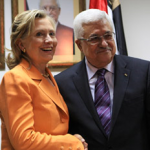Will Leaks End Mideast Peace Process?
 Leaked documents showing the Palestinian Authority open to concessions could lose them the support of the Palestinian people.
Leaked documents showing the Palestinian Authority open to concessions could lose them the support of the Palestinian people.
The leaked documents published by Al-Jazeera and The Guardian show the Palestinian Authority considering concessions in exchange for big gains. But, as I discuss in my latest column for CNN, the revelations may have also lost them the support of the Palestinian people.
It's being called a Palestinian Wikileaks: a dump of 1,600 Palestinian Authority documents to Al-Jazeera and the British newspaper The Guardian.
The first releases reveal Palestinian negotiating concessions. Later releases will (the Guardian claims) detail the extent of Israeli-Palestinian Authority security cooperation.
In the words of a Guardian columnist today:
"Who will be most damaged by this extraordinary glimpse into the reality of the Israeli-Palestinian peace process? Perhaps the first casualty will be Palestinian national pride, their collective sense of dignity in adversity badly wounded by the papers revealed today.
"Many on the Palestinian streets will recoil to read not just the concessions offered by their representatives -- starting with the yielding of those parts of East Jerusalem settled by Israeli Jews -- but the language in which those concessions were made."
More bluntly, Blake Hounshell, managing editor of Foreign Policy magazine, has suggested that January 23, 2011, be marked as the day "the two-state solution died."
Yet very arguably, the real news about the documents is that there is no news.
Former Palestinian Liberation Organization representative Karma Nabulsi writes on the Guardian's website, "had such deals eventually come to light, Palestinians would have rejected them comprehensively." Nabulsi is almost certainly correct, and that is the tragedy of the story.
When American officials think about the Israeli-Palestinian dispute, they see a simple solution:
Divide the country along the 1967 armistice lines. The Palestinians get the West Bank and Gaza. Israel gets Israel. Jerusalem is shared somehow. The Palestinian state is disarmed, so that Israel gets security. The international community is mobilized, so that the Palestinians get money.
That rough sketch leaves aside many important technical details -- water rights, for example -- but basically, it's the answer that every American president since Jimmy Carter has carried in his head.
This answer seems so compelling to Americans that you'll often hear U.S. experts on the issue say, "Everybody knows what the answer has to be."
"Everybody knows"? Not so fast.
The Palestinian leaks show the Palestinian Authority leadership trying to work their way to the answer that "everybody knows."
But the secrecy surrounding the documents -- and the reaction to the leak -- confirms the Israelis' worst fear: The Palestinian population does not, in fact, "know" what "everybody knows." And a Palestinian leadership that did "know" what "everybody knows" is now being reviled by its own population as traitors and sell-outs.
What, after all, are the big, shameful concessions contained in the documents? Where are the wounds to Palestinian national pride?
• The documents as reported demand Palestinian sovereignty over almost all of historic Jerusalem, including the Western Wall, the holiest site in Judaism.
• The documents demand Palestinian control of lands equal in territory to the 1967 lands. Any border adjustment to reflect Israeli settlement activity would have to be balanced by an equivalent surrender of Israeli land to the new Palestinian state.
• Even after the Palestinians get their state on the other side of the 1967 line, the documents demand some kind of recognition of a Palestinian right to "return" to the Israeli side of the line. At one point, the documents suggest that the Israelis be required to resettle 100,000 Palestinians inside Israel.
If these ideas had been accepted as the basis of a final treaty between Israel and Palestine, every Middle East expert in Washington would have agreed that the Palestinians had done very, very, very well for themselves.
And yet, it never happened. It did not happen in very large part for exactly the reason now confessed by angry Palestinians themselves: because the actual demands of the Palestinian population are so much greater than any diplomat can gain.
Click here to read the rest.